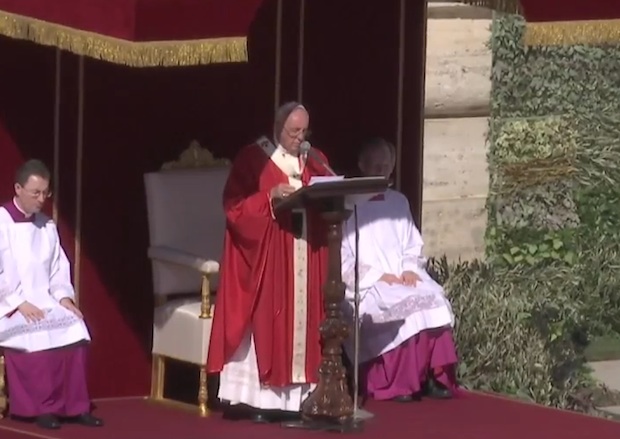Palm Sunday opened Holy Week on Sunday, as did heavy duty pre-Passover preparation for many of us, as Easter Sunday and the second day of Passover coincide this year, but more on that in another post. For now I want to focus on Pope Francis’ Palm Sunday address — specifically his tribute to contemporary Christian martyrs.
“We think too of the humiliation endured by all those who, for their lives of fidelity to the Gospel, encounter discrimination and pay a personal price,” Pope Francis said, speaking in Italian. “We think too of our brothers and sisters who are persecuted because they are Christians, the martyrs of our own time. There are many of them.”
As much respect as I have for the Holy Father — especially his unique capacity to combine fealty to tradition and fearless openness to new realities and previously unaddressed people — and as easy as it is for sincere questions to slip into unfair criticism, I can’t quiet the discomfort with choosing to celebrate martyrdom in a world with so many people celebrating death in the name of God.
There is no question that Christians are dying in numbers unprecedented in the past century at least. There is also no doubt that if the trend continues, combined with Christians leaving because increasingly hostile governments, the Middle East — with the exception of Israel — could be largely emptied of Christians in the coming years. It is a tragedy of epic proportions, for sure — one that demands precisely the kind of global attention which the Pope can bring to it. But could that attention be focused as successfully without celebrating the tragedy of their deaths as martyrs?
I get that Holy Week, leading as it does to Good Friday and culminating in Easter, is the week for reflection on, and celebration of, Christian martyrdom. I also get that martyrdom is a sacred concept in most every religious tradition and that there are things worth dying for in this world. But with so many people and teachers celebrating the holiness of dying for God, I wonder if we could not focus more on the importance of living for God and the ugliness of stripping others of the right to pursue their best understanding of what that might mean.
Perhaps if I heard Pope Francis’ words with “Christian ears” and felt them with a “Christian heart”, I might not have these questions. I don’t know.
I do know however, that the issue to which the Pope calls our attention is hugely important. I just wonder, and this is no rhetorical question, if focusing more on the human tragedy, and less on the religious category — martyrdom — which is so often abused by others, might not help us all address that tragedy better.

Listed for many years in Newsweek as one of America’s “50 Most Influential Rabbis” and recognized as one of our nation’s leading “Preachers and Teachers,” by Beliefnet.com, Rabbi Brad Hirschfield serves as the President of Clal–The National Jewish Center for Learning and Leadership, a training institute, think tank, and resource center nurturing religious and intellectual pluralism within the Jewish community, and the wider world, preparing people to meet the biggest challenges we face in our increasingly polarized world.
An ordained Orthodox rabbi who studied for his PhD and taught at The Jewish Theological Seminary, he has also taught the University of Pennsylvania, where he directs an ongoing seminar, and American Jewish University. Rabbi Brad regularly teaches and consults for the US Army and United States Department of Defense, religious organizations — Jewish and Christian — including United Seminary (Methodist), Yeshivat Chovevei Torah (Modern Orthodox) Luther Seminary (Lutheran), and The Jewish Theological Seminary (Conservative) — civic organizations including No Labels, Odyssey Impact, and The Aspen Institute, numerous Jewish Federations, and a variety of communal and family foundations.
Hirschfield is the author and editor of numerous books, including You Don’t Have To Be Wrong For Me To Be Right: Finding Faith Without Fanaticism, writes a column for Religion News Service, and appears regularly on TV and radio in outlets ranging from The Washington Post to Fox News Channel. He is also the founder of the Stand and See Fellowship, which brings hundreds of Christian religious leaders to Israel, preparing them to address the increasing polarization around Middle East issues — and really all currently polarizing issues at home and abroad — with six words, “It’s more complicated than we know.”

